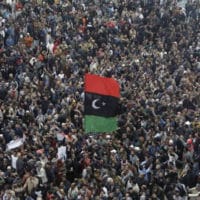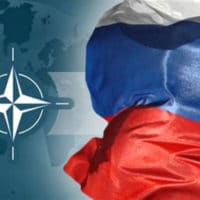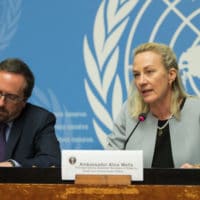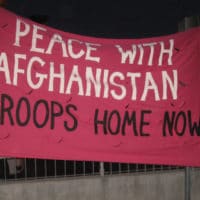-
Turkey’s big bet has put Libya in center of a global power struggle
The series of debilitating military setbacks that Libya’s renegade general Khalifa Haftar suffered in recent months have spurred diplomatic activities over the conflict in the country. But the war is far from over.
-
NATO returns to Libya to challenge Russia
The great game in Libya has begun surging with the United States shedding its strategic ambivalence and resorting to a proactive role. At the end of May, the Pentagon marked a dramatic escalation by accusing Moscow of bolstering “Kremlin-linked mercenaries” who are allegedly helping Khalifa Haftar, the eastern warlord in Libya.
-
Don’t threaten Afghans—it will be counterproductive
The principal deputy assistant secretary at the Bureau of South and Central Asian Affairs (SCA) in the U.S. State Department, Alice Wells, dropped a bombshell on the Afghan government and the country’s political elites on April 4—and caught the international donors by surprise, too—by linking all aid to Afghanistan to the formation of an inclusive government in Kabul.
-
Has America reached its endgame in Afghanistan?
In an extraordinary statement titled “On the Political Impasse in Afghanistan,” Washington has admitted to the failure of Secretary of State Mike Pompeo’s mission to Kabul on March 23, which was taken up to heal the political rift among Afghan politicians and to urge them to form an inclusive government so as to implement the peace agreement signed in Doha on February 29.
-
The prospect of peace in Afghanistan is real—and Pakistan is the key player
The U.S.-Taliban peace agreement signed in Doha on February 29 must be put in proper perspective. Indeed, there can’t be two opinions that the curtain is coming down on what U.S. President Donald Trump called the “endless war” in which America squandered away over a trillion dollars and lost thousands of lives with no victory in sight. Equally, without a doubt, this is the finest hour of Pakistan’s statecraft since the country’s creation in 1947.
-
A World no longer shaped by Atlantic powers
The annual Munich Security Conference that took place February 14-16 this year turned out to be an iconic event, drawing comparison with the one held in the same Bavarian city on February 10, 2007, where in a prophetic speech Russian President Vladimir Putin had criticized the world order characterized by the United States’ global hegemony and its “almost uncontained hyper use of force—military force—in international relations.”





![Secretary of State Michael R. Pompeo participates in a signing ceremony in Doha, Qatar, on February 29, 2020. [State Department photo by Ron Przysucha/ Public Domain]](https://mronline.org/wp-content/uploads/2020/03/peace-signing-200x200.jpg)
